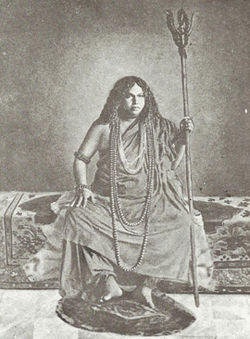Swami Pranavananda
Swami Pranavananda | |
|---|---|
 Swami Pranavananda | |
| Personal | |
| Born | Binode Bhuiya 29 January 1896 |
| Died | 8 January 1941 (aged 44) |
| Religion | Hinduism |
| Nationality | Indian |
| Founder of | Bharat Sevashram Sangha |
Swami Pranavananda (Bengali: স্বামী প্রণবানন্দ; Sanskrit: स्वामी प्रणवानन्द, IAST: Svāmī Praṇavānanda) also known as Yugācāryya Śrīmat Svāmī Praṇavānanda Jī Mahārāja (Bengali: যুগাচার্য্য শ্রীমৎ স্বামী প্রণবানন্দ জী মহারাজ; Hindi: युगाचार्य्य श्रीमत् स्वामी प्रणवानन्द जी महाराज), (29 January 1896 – 8 January 1941)[1] was a Hindu yogi and saint who founded a not-for-profit and spiritual organization known as the Bharat Sevashram Sangha.[2] He is remembered for his pioneering efforts to bring the modern Hindu society into the new age without compromising the essential values of ancient traditions of Hindu spirituality.[3] Swamiji was one of the most influential spiritual leaders of modern India. He is still revered very much for his message of universal love, compassion for all humanity and social reform without giving up the nationalist zeal, the love of mother land.[4]
He was born on 29 January 1896, the auspicious day of Maghi Purnima (16th Magha, 1302), in a Bengali Kayasth family Bajitpur in a village in Faridpur District in undivided India (presently in Bangladesh). His parents Vishnu Charan Bhuia and Saradadevi were very pious and blessed by Lord Shiva to have a son for the mitigation of human suffering and universal emancipation. He was affectionately named Jaynath by his father at birth and later in his boyhood he was called Binod. Binod showed uncommon philosophical inclinations and had divine visions since childhood and often could be seen in deep contemplation at the village school. He was popular with the children of the locality because of his helpful nature.[5][4]
References[edit]
- ↑ Library of Congress Office, New Delhi (1981). Accessions List, South Asia. E.G. Smith. p. 90. Retrieved 14 December 2012.
- ↑ Subodh Kapoor (1 July 2002). The Indian Encyclopaedia: Biographical, Historical, Religious, Administrative, Ethnological, Commercial and Scientific. Indo-Pak War-Kamla Karri. Cosmo Publication. pp. 6887–. ISBN 978-81-7755-257-7. Retrieved 14 December 2012.
- ↑ Dasgupta, Koushiki (2012). "Hinduising the Hindus and Politicizing the 'Consciousness': A Focus on the "Bharat Sevashram Sangha" in Late Colonial Bengal". Proceedings of the Indian History Congress. 73: 697–706. ISSN 2249-1937. JSTOR 44156265.
- ↑ 4.0 4.1 Mukhopadhyay 1996.
- ↑ Hindu Regeneration Bharat Sevashram Sangha, Hyderabad Branch - 1978 - Volume 8 - Page 67
Further reading[edit]
- Shantananda, Swami (1975). Acharya Pranavananda in the Eyes of the Learned. Bharat Sevashram Sangha.
- Mukhopadhyay, Prasanta (1996). Swami Pranavananda: The World-teacher and Saint-saviour ; (an Oblation on the Eve of Birth Centenary of Swami Pranavananda). Bharat Sevshram Sangha.
- Smart, Ninian; Purnananda, Swami (2017). Prophet of a New Hindu Age: The Life and Times of Acharya Pranavananda. Routledge. ISBN 978-1-351-80105-8.